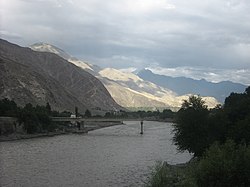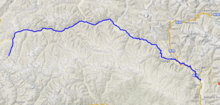Gilgit River
| Gilgit River | |
|---|---|
 | |
 Course of the Gilgit River | |
| Native name | دریائے گلگت (Urdu) |
| Location | |
| Country | Pakistan |
| Autonomous territory | Gilgit-Baltistan |
| Districts | Gupis-Yasin, Ghizer and Gilgit |
| Physical characteristics | |
| Mouth | |
• coordinates | 35°44′31″N 74°37′29″E / 35.74194°N 74.62472°E |
| Length | 240 km |
| Basin features | |
| Waterbodies | Shandur Lake, Phander Lake, Attabad Lake |
The Gilgit River (Urdu: دریائے گلگت) is a tributary of the Indus River, flowing through various districts of Pakistan's Gilgit-Baltistan region, including Gupis-Yasin, Ghizer and Gilgit. The Gilgit River originates from Shandur Lake[1] and proceeds to join the Indus River near the towns of Juglot and Bunji. This confluence is believed to mark the meeting point of three prominent mountain ranges: the Hindu Kush, the Himalayas, and the Karakoram.[2][3]
The upper sections of the Gilgit River are referred to as the Gupis River and Ghizer River.

See also
[edit]References
[edit]- ^ isbn:1483603792 - Cerca con Google (in Italian).
- ^ Handy, Norman (2017). K2, The Savage Mountain: Travels in Northern Pakistan. novum pro Verlag. ISBN 9783990487174.
- ^ Dani, Ahmad Hasan; Masson, Vadim Mikhaĭlovich (2003). History of Civilizations of Central Asia: Development in contrast : from the sixteenth to the mid-nineteenth century. UNESCO. ISBN 9789231038761.
Wikimedia Commons has media related to Gilgit River.


 French
French Deutsch
Deutsch